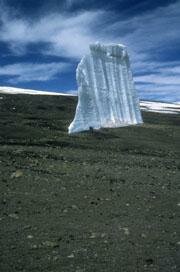
Name: Brian
Email:
Bio: I'm a science reporter for The Washington Post, where I cover...science, all of it. Previously, I spent six years as a freelancer, writing for many publications. I've also been a staff reporter at Science News and JAMA.
Posts by :
-
I’m moving…
January 15th, 2011…out of my home office and into the newsroom of the Washington Post. For the next six months I’ll be on the general science beat at the paper, which lost most of its science reporters during the past three years of brutal buy-outs and downsizing. I’m thrilled for the opportunity to bring more science to the Post. Look for my stories online and in the *gasp* print paper too.
Bacteria devoured methane from Gulf spill
January 15th, 2011H
 ungry microbes ate nearly all of the methane spewed by the Macondo well in the Gulf of Mexico, I report in this piece for the Washington Post.
ungry microbes ate nearly all of the methane spewed by the Macondo well in the Gulf of Mexico, I report in this piece for the Washington Post.Invasive insects threaten trees, forest
December 12th, 2010 Invasive insects, like this emerald ash borer, have destroyed tens of millions of trees in the United States. In a piece for the Washington Post, I track the bugs and call into question USDA regulations meant to stem the tide of tiny invaders.
Invasive insects, like this emerald ash borer, have destroyed tens of millions of trees in the United States. In a piece for the Washington Post, I track the bugs and call into question USDA regulations meant to stem the tide of tiny invaders.Another BBC Appearance
August 25th, 2010 I appeared live on the BBC World Service (twice) in the wee hours (UK time) of Aug. 23, to discuss the ebola virus. Researchers at the U.S. Army Medical Research Institute of Infectious Diseases have made progress on an anti-ebola drug. It would be the first such drug if human trials prove successful. In 2004, I wrote in JAMA about the same researchers’ efforts to produce an ebola vaccine – efforts that continue. The bottom line with ebola is that it’s very tough to treat, and because it causes so few deaths worldwide, there’s no drug company invested in it. So most ebola research is conducted by the U.S. military, which is concerned that the virus could be weaponized and used by bioterrorists.
I appeared live on the BBC World Service (twice) in the wee hours (UK time) of Aug. 23, to discuss the ebola virus. Researchers at the U.S. Army Medical Research Institute of Infectious Diseases have made progress on an anti-ebola drug. It would be the first such drug if human trials prove successful. In 2004, I wrote in JAMA about the same researchers’ efforts to produce an ebola vaccine – efforts that continue. The bottom line with ebola is that it’s very tough to treat, and because it causes so few deaths worldwide, there’s no drug company invested in it. So most ebola research is conducted by the U.S. military, which is concerned that the virus could be weaponized and used by bioterrorists.Audio clip: Adobe Flash Player (version 9 or above) is required to play this audio clip. Download the latest version here. You also need to have JavaScript enabled in your browser.
The Brain Fixer
August 18th, 2010Call it the brain fixer: A potent growth factor that could reverse stroke, interrupt addiction, and halt Parkinson’s disease. But getting it into the brain has proved challenging. In this feature for Nature I explore new technology for sneaking this growth factor, GDNF, into the brain. [Read Story]
Machupo Hunter
August 5th, 2010 My profile of a young scientific superstar, Jonathan Abraham, appears in the August HHMI Bulletin. Abraham tackles a deadly, emerging South American virus, machupo.[Read Story]
My profile of a young scientific superstar, Jonathan Abraham, appears in the August HHMI Bulletin. Abraham tackles a deadly, emerging South American virus, machupo.[Read Story]Can the Peace Drug Help Clean up the War Mess?
April 21st, 2010 I recently attended psychedelic medicine’s coming out party - a meeting of 1100 researchers and enthusiasts in San Jose, Calif. – and found the early data on MDMA (‘Ecstasy’) as an adjunct to talk therapy for post-traumatic stress disorder pretty compelling. Scientific American ran my piece on the study, which features a vet who says the therapy eliminated his PTSD symptoms. [Read Story]
I recently attended psychedelic medicine’s coming out party - a meeting of 1100 researchers and enthusiasts in San Jose, Calif. – and found the early data on MDMA (‘Ecstasy’) as an adjunct to talk therapy for post-traumatic stress disorder pretty compelling. Scientific American ran my piece on the study, which features a vet who says the therapy eliminated his PTSD symptoms. [Read Story] Ghostwriting “The Great Prostate Mistake”
March 10th, 2010My first publication in the New York Times doesn’t have my name on it – but I’m proud of it nonetheless. It’s an Op-Ed about the dangers of P.S.A. testing that I penned for Dr. Richard Ablin, who discovered prostate specific antigen in 1970. The piece made it to the top of the “most e-mailed” list at the Times. Read it here.
Live Radio – BBC World Service
February 25th, 2010Audio clip: Adobe Flash Player (version 9 or above) is required to play this audio clip. Download the latest version here. You also need to have JavaScript enabled in your browser.
I discuss stem cell tourism with BBC superstar Matt McGrath. My yapping starts about halfway in. From Feb. 19, 2010, San Diego.
The Melting Snows of Kilimanjaro
November 3rd, 2009
Glacier remnant on Kilimanjaro
The snows of Kilimanjaro are rapidly disappearing and will be gone by 2033, predicts the most detailed analysis yet of the iconic glaciers gracing Africa’s highest peak.
”They’re being decapitated,” says study leader Lonnie Thompson. “In fact, they’re probably not really glaciers anymore. They’re remnants of another climate.”
Published in Nature. [Link]




